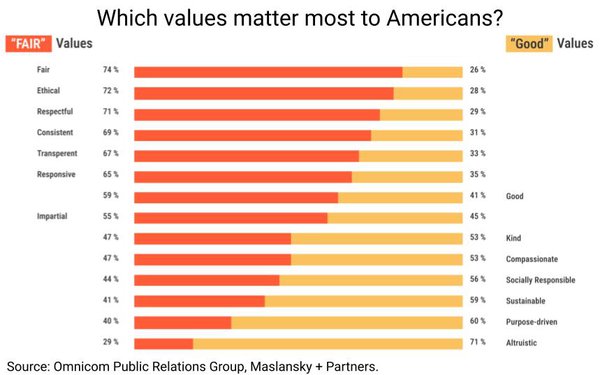
Decades into the decline of trust, a new study by Omnicom and
political and consumer marketing language consultants Maslansky + Partners suggests it might be time for a "rage" barometer, or at the very least new methods for addressing the increasingly angry
sentiment that Americans on all ends of the political spectrum feel about not being treated fairly.
Whether it's the inequity of DEI-oriented constituents, or the corresponding anger triggered
on the other side of the spectrum by attendant virtue-signaling, Americans increasingly are raging against companies, institutions and policies they feel are treating them unfairly.
And while
the researchers have not actually developed a Rage Barometer, they just published a new report -- "The Fairness Factor" -- which includes a bunch of compelling stats, as well as a nifty "Fair Values"
vs. "Good Values" grid to help organizations get at the underlying sentiment.
advertisement
advertisement
"Outrage is everywhere -- and it's not just about politics anymore," CEO Michael Maslansky writes in a letter sent
to "Red, White & Blog," adding: "The old rules don't work. 'Doing good' isn't enough. Purpose won't protect you."
That's why, he adds, his firm partnered with Omnicom Public Relations
Group to "uncover what's really fueling today's outrage, why trust is eroding, and -- most importantly -- what you can do to protect your brand."
To me, it's part of an ongoing progression
that probably always existed, but began to truly manifest with the Newt Gingrich-style of grievance politics, which only became exacerbated by the polarizing media pundits -- from Rush Limbaugh
through Fox News -- to the current administration's weaponization of disgruntlement, including attacks on marketers, platforms and institutions that have still been trying to address equity.
While many of them -- marketers in particular -- have responded with more "quiet DEI" strategies, Maslansky is making the case that a more fundamental
reset needs to take place, stripping politics, virtues and goodness out of the equation altogether, and focusing on the bottom line of "fairness."
That's fair, but it's just a starting point,
because what's fair to one American may not be fair to another. What we really need is a sophisticated method or model for understanding the deep-rooted inequities among Americans of all
persuasions.
In the meantime, Maslansky is at least offering some guideposts and practical applications that address the problem tactically, if not strategically, including:
- The hidden triggers that spark outrage before it hits your brand
- The actions most likely to cause backlash and how to avoid them
- The language and
strategies that actually build trust in an increasingly toxic environment